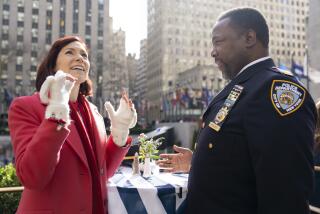TV review: ‘Person of Interest’
“Person of Interest,” the new thriller from Jonathan Nolan and J.J. Abrams that premieres Thursday on CBS, proves, once again, that a great idea for a television show is not at all the same thing as a great television show.
The central conceit of “Person of Interest,” which smartly mines post-9/11 anxieties, is that crimes can now be detected before they are committed, as in 2002’s “Minority Report,” only without the damp and distressing pre-cogs. In their place is a computer program, designed by the mysterious Mr. Finch (Michael Emerson), a billionaire genius enlisted by Homeland Security to design pattern recognition software to sort through all the newly authorized Big Brotherish social surveillance for signs of another terrorist attack. The program also spits out a second group of patterns, those that predict smaller crimes. To prevent these, Finch seeks out the services of Reese (James Caviezel), an ex-CIA agent so undone by the death of his lover that he is presumed dead.
We meet him, unshaved and unkempt, as he is riding the subway, apparently surrendered to fever dreams and tequila. But when a group of young thugs attempts to swipe his hooch, he goes all Jason Bourne, quickly dispatching them all with nothing but his panther-like moves and killer instinct. In the best scene of the pilot, a cop played by Taraji P. Henson tries to figure him out — “You’re military, right?” — but by the time his prints reveal warrants for crimes “all over the world,” Reese is gone. He has been sprung by Finch, who in one of those on the waterfront, under a big bridge scenes of which directors cannot get enough, explains his master plan.
Which is, quite frankly, pretty dang thin. The only real info Finch can wangle through the back door of his program is a list of Social Security numbers. What the crime will be, and whether these folks are the victims or perpetrators, remains a mystery — they are, simply, people of interest. It’s up to Reese and all the nifty, swifty surveillance equipment money can by to figure things out.
This sounds, as no doubt it did to CBS executives, a lot more interesting than it turns out to be. Emerson, with a signature verbal syncopation that may soon rival Alan Rickman’s, brings to Finch the same creepy brilliance he gave Ben Linus on “Lost.” Clearly, there is more to Finch than meets the eye, and discovering what that might be is the most tantalizing portion of the pilot.
Caviezel, who played Jesus in “The Passion of the Christ,” appears to be going for an Eastwoodian effect here, down to half-closed eyes and menacing growl. But though he radiates the requisite menacing efficiency during the action scenes, he lacks that flicker of life, heart, humor and basic humanity that not only separates a hero-warrior from a soulless gun-for-hire but also makes him worth watching for the rest of the season.
Reese does, however, refuse to kill anyone except the really, truly bad guys. And if he shoots as many people in the leg during the second episode as he does in the pilot, it could spawn a new drinking game.
The notion of preventing crimes rather than solving them is an appealing twist, although the crime in the pilot is fairly boring. At least the surveillance graphics are very cool. But when the only real tension is one character telling another to hurry and the most emotionally involving scene lasts 30 seconds and involves the cop who may not engage with the principals again all season, it’s difficult to remain an interested person.
More to Read
The complete guide to home viewing
Get Screen Gab for everything about the TV shows and streaming movies everyone’s talking about.
You may occasionally receive promotional content from the Los Angeles Times.







